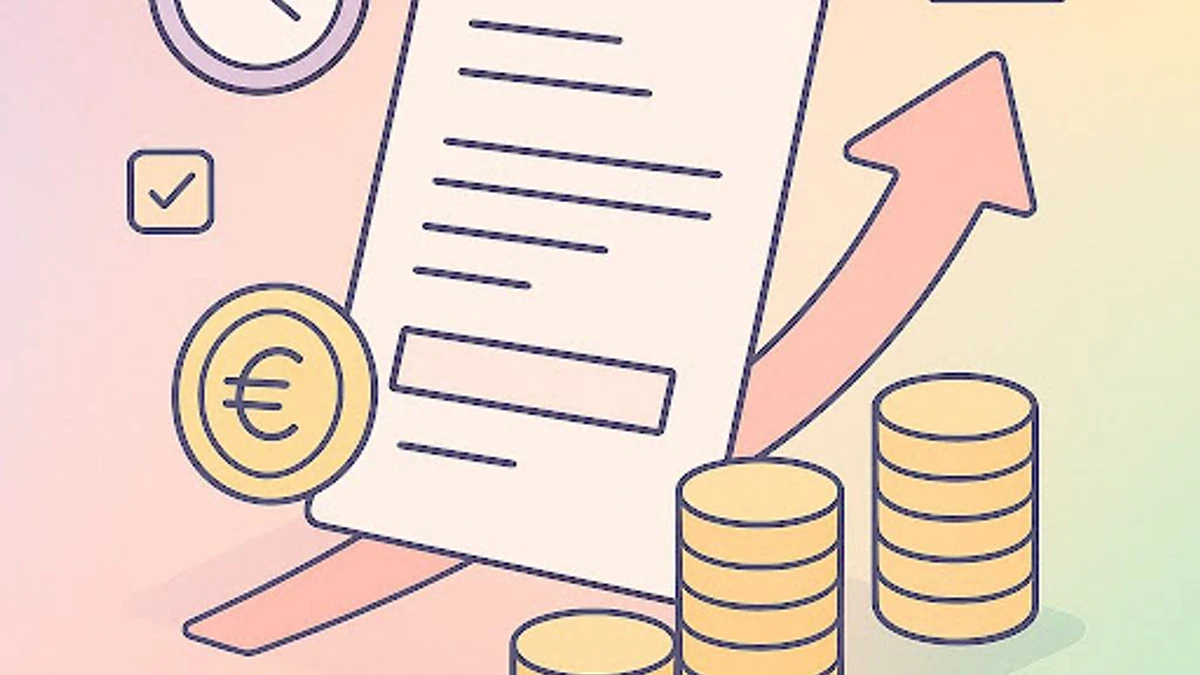Unpaid bill surcharges: what can you really charge?
Summarize this article with AI
Open the article in your preferred AI to summarize, explore and save it for later.

When a customer doesn't pay on time, you have the right to add charges to the invoice. But you need to know which charges are allowed, how to calculate them and, above all, how to get them paid.
Here's what you need to know about the majority of unpaid bills:
You can increase an unpaid invoice with : → des late fees (e.g. : 14,5 % per annum if ECB rate is 4.5%) → a fixed indemnity of €40 → of the additional costs if you can prove actual expenses (bailiff, law firm)
These fees are reserved for delays between professionals (B2B)
They are due on the day following the due date without prior reminder
To be valid, the information must appear on the facture initiale or in your CGV
Without this information, you lose the right to invoice them. r
Example: for €2,000 unpaid for 30 days, you can invoice 63,84 € (including €40 flat-rate fee)
Le customer can contest in case of dispute or missing information
If payment is refused, go to the reminder, formal notice then order for payment
Heropay vous aide automate reminders and secure your cash flow without friction
What charges can be added to an unpaid bill?
The law strictly regulates the surcharges you can apply. Here are the three main types of fees to be aware of.
Late payment penalties: rates, calculation and conditions
You can apply penalties from day after maturity . The law sets a minimum rate equal to ECB key rate raised by 10 points (article L441-10 of the French Commercial Code) .
For example, with an ECB rate of 4.5%, the legal minimum is 14.5 % par an . There's nothing to stop you from setting a higher rate, as long as it's within your budget. mentioned in your General Terms and Conditions or on your invoices .
Flat-rate indemnity of €40 for collection costs
This allowance is mandatory and applies automatically for delays between professionals (B2B). You must invoice it in addition to late penalties from the first day of delay, without prior reminder .
It is listed in the article D441-5 of the French Commercial Code and does not depend or the invoice amount nor the length of the delay.
Any additional collection costs
If the delay requires you to hire actual costs (bailiff, collection agency, etc.), you can claim additional compensation. provided you can prove these expenses .
This does not replace the €40 compensation, but is in addition to it. The judge may, however reduce or refuse this request if it seems abusive or unjustified.
When and how to apply a surcharge for unpaid bills?
You can't just apply a surcharge at random: it must comply with legal conditions and appear on your billing documents.
Legal requirements
You must have mentioned late payment penalties and €40 indemnity in your terms and conditions of sale (CGV) or on the facture initiale .
Without it, you cannot be billed even in the event of a proven delay.
Mandatory information on the invoice
To be enforceable, the initial invoice must contain :
Late payment penalty rates
Mention of the €40 flat-rate indemnity
The starting point for penalties (often the day after the due date)
Terms of payment (deadlines, payment methods)
Without this information, you will not be able to claim any surcharges.
Example of how to calculate a mark-up
An invoice from 2 000 € expired since 30 days with a legal rate of 14,5 % :
Penalties : 2 000 × 14,5 % / 365 × 30 ≈ 23,84 €
Flat-rate allowance : 40 €
Total majoration : 63,84 €
What are the limits to surcharges on unpaid bills?
Even if the law allows you to mark up, you must respect certain frameworks to avoid disputes.
Customer disputes
The customer may refuse to pay the surcharge if :
No legal information
The amount of the claim is disputed
The delay is due to a genuine commercial disagreement
In this case, the judge will decide whether the increase is justified.
Risks if legal notices are missing
If you don't have did not indicate penalties or compensation on the invoice you lose the right to invoice them.
You also risk have your payment order rejected for formal defects.
What if the customer refuses to pay the surcharge?
If the customer does not pay the surcharge, you can initiate a graduated procedure.
Amicable reminders, formal notices and payment orders
Start with a clear reminder with a statement of charges due.
If there's no response, send a formal notice . If nothing moves, file an injunction to pay to the competent court.
Using a collection service or bailiff
You can also appoint a huissier or a collection company to speed up the process.
Certain expenses incurred may be recoverable if the judge validates them.
Heropay helps you control your cash flow
Heropay allows you to simply bill your penalties of monitor payment times and act quickly in case of retard.
With automatic reminders a access to payment orders online and a payment tracking you keep the control over your cash flow without wasting any time.